Deck 30: Magnetic Fields and Forces
Question
Question
Question
Question
Question
Question
Question
Question
Question
Question
Question
Question
Question
Question
Question
Question
Question
Question
Question
Question
Question
Question
Question
Question
Question
Question
Question
Question
Question
Question
Question
Question
Question
Question
Question
Question
Question
Question
Question
Question
Question
Question
Question
Question
Question
Question
Question
Question
Question
Question
Question
Question
Question
Question
Question
Question
Question
Question
Question
Question
Question
Question
Question
Question
Question
Question
Question
Question
Question
Question
Question
Question
Question
Question
Question

Unlock Deck
Sign up to unlock the cards in this deck!
Unlock Deck
Unlock Deck
1/75
Play
Full screen (f)
Deck 30: Magnetic Fields and Forces
1
What is the magnitude of the magnetic force on a charged particle (Q = 5.0 μC) moving with a speed of 80 km/s in the positive x direction at a point where Bx = 5.0 T, By = −4.0 T, and Bz = 3.0 T?
A)2.8 N
B)1.6 N
C)1.2 N
D)2.0 N
E)0.4 N
A)2.8 N
B)1.6 N
C)1.2 N
D)2.0 N
E)0.4 N
2.0 N
2
An electron has a velocity of 6.0 × 106 m/s in the positive x direction at a point where the magnetic field has the components Bx = 3.0 T, By = 1.5 T, and Bz = 2.0 T. What is the magnitude of the acceleration of the electron at this point?
A)2.1 × 1018 m/s2
B)1.6 × 1018 m/s2
C)2.6 × 1018 m/s2
D)3.2 × 1018 m/s2
E)3.7 × 1018 m/s2
A)2.1 × 1018 m/s2
B)1.6 × 1018 m/s2
C)2.6 × 1018 m/s2
D)3.2 × 1018 m/s2
E)3.7 × 1018 m/s2
2.6 × 1018 m/s2
3
A straight wire is bent into the shape shown. Determine the net magnetic force on the wire when the current I travels in the direction shown in the magnetic field  .
. 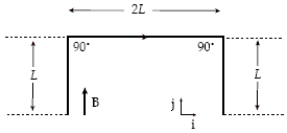
A)2IBL in the −z direction
B)2IBL in the +z direction
C)4IBL in the +z direction
D)4IBL in the −z direction
E)zero
 .
. 
A)2IBL in the −z direction
B)2IBL in the +z direction
C)4IBL in the +z direction
D)4IBL in the −z direction
E)zero
2IBL in the +z direction
4
A 2.0-C charge moves with a velocity of  m/s and experiences a magnetic force of
m/s and experiences a magnetic force of  N. The x component of the magnetic field is equal to zero. Determine the y component of the magnetic field.
N. The x component of the magnetic field is equal to zero. Determine the y component of the magnetic field.
A)−3.0 T
B)+3.0 T
C)+5.0 T
D)−5.0 T
E)+6.0 T
 m/s and experiences a magnetic force of
m/s and experiences a magnetic force of  N. The x component of the magnetic field is equal to zero. Determine the y component of the magnetic field.
N. The x component of the magnetic field is equal to zero. Determine the y component of the magnetic field.A)−3.0 T
B)+3.0 T
C)+5.0 T
D)−5.0 T
E)+6.0 T

Unlock Deck
Unlock for access to all 75 flashcards in this deck.
Unlock Deck
k this deck
5
A segment of wire carries a current of 25 A along the x axis from x = −2.0 m to x = 0 and then along the y axis from y = 0 to y = 3.0 m. In this region of space, the magnetic field is equal to 40 mT in the positive z direction. What is the magnitude of the force on this segment of wire?
A)2.0 N
B)5.0 N
C)1.0 N
D)3.6 N
E)3.0 N
A)2.0 N
B)5.0 N
C)1.0 N
D)3.6 N
E)3.0 N

Unlock Deck
Unlock for access to all 75 flashcards in this deck.
Unlock Deck
k this deck
6
A 2.0-m wire carries a current of 15 A directed along the positive x axis in a region where the magnetic field is uniform and given by B =  mT. What is the resulting magnetic force on the wire?
mT. What is the resulting magnetic force on the wire?
A)(+1.2 ) N
) N
B)(−1.2 ) N
) N
C)(−1.5 ) N
) N
D)(+1.5 ) N
) N
E)(+0.90 ) N
) N
 mT. What is the resulting magnetic force on the wire?
mT. What is the resulting magnetic force on the wire?A)(+1.2
 ) N
) NB)(−1.2
 ) N
) NC)(−1.5
 ) N
) ND)(+1.5
 ) N
) NE)(+0.90
 ) N
) N
Unlock Deck
Unlock for access to all 75 flashcards in this deck.
Unlock Deck
k this deck
7
A straight wire carries a current of 40 A in a uniform magnetic field (magnitude = 80 mT). If the force per unit length on this wire is 2.0 N/m, determine the angle between the wire and the magnetic field.
A)either 39° or 141°
B)either 25° or 155°
C)either 70° or 110°
D)either 42° or 138°
E)either 65° or 115°
A)either 39° or 141°
B)either 25° or 155°
C)either 70° or 110°
D)either 42° or 138°
E)either 65° or 115°

Unlock Deck
Unlock for access to all 75 flashcards in this deck.
Unlock Deck
k this deck
8
A particle (mass = 2.0 mg, charge = −6.0 μC) moves in the positive direction along the x axis with a velocity of 3.0 km/s. It enters a magnetic field of  mT. What is the acceleration of the particle?
mT. What is the acceleration of the particle?
A) m/s2
m/s2
B) m/s2
m/s2
C) m/s2
m/s2
D) m/s2
m/s2
E) m/s2
m/s2
 mT. What is the acceleration of the particle?
mT. What is the acceleration of the particle?A)
 m/s2
m/s2B)
 m/s2
m/s2C)
 m/s2
m/s2D)
 m/s2
m/s2E)
 m/s2
m/s2
Unlock Deck
Unlock for access to all 75 flashcards in this deck.
Unlock Deck
k this deck
9
A particle (mass = 6.0 mg) moves with a speed of 4.0 km/s in a direction that makes an angle of 37° above the positive x axis in the xy plane. At the instant it enters a magnetic field of (5.0  ) mT it experiences an acceleration of (8.0
) mT it experiences an acceleration of (8.0  ) m/s2. What is the charge of the particle?
) m/s2. What is the charge of the particle?
A)−4.8 μC
B)4.0 μC
C)−4.0 μC
D)4.8 μC
E)−5.0 μC
 ) mT it experiences an acceleration of (8.0
) mT it experiences an acceleration of (8.0  ) m/s2. What is the charge of the particle?
) m/s2. What is the charge of the particle?A)−4.8 μC
B)4.0 μC
C)−4.0 μC
D)4.8 μC
E)−5.0 μC

Unlock Deck
Unlock for access to all 75 flashcards in this deck.
Unlock Deck
k this deck
10
A 2.0-C charge moves with a velocity of (  m/s and experiences a magnetic force of
m/s and experiences a magnetic force of  N. The x component of the magnetic field is equal to zero. Determine the z component of the magnetic field.
N. The x component of the magnetic field is equal to zero. Determine the z component of the magnetic field.
A)−3.0 T
B)+3.0 T
C)+5.0 T
D)−5.0 T
E)+6.0 T
 m/s and experiences a magnetic force of
m/s and experiences a magnetic force of  N. The x component of the magnetic field is equal to zero. Determine the z component of the magnetic field.
N. The x component of the magnetic field is equal to zero. Determine the z component of the magnetic field.A)−3.0 T
B)+3.0 T
C)+5.0 T
D)−5.0 T
E)+6.0 T

Unlock Deck
Unlock for access to all 75 flashcards in this deck.
Unlock Deck
k this deck
11
A straight wire of length 70 cm carries a current of 50 A and makes an angle of 60° with a uniform magnetic field. If the force on the wire is 1.0 N what is the magnitude of  ?
?
A)41 mT
B)33 mT
C)55 mT
D)87 mT
E)57 mT
 ?
?A)41 mT
B)33 mT
C)55 mT
D)87 mT
E)57 mT

Unlock Deck
Unlock for access to all 75 flashcards in this deck.
Unlock Deck
k this deck
12
A particle (q = 5.0 nC, m = 3.0 μg) moves in a region where the magnetic field has components Bx = 2.0 mT, By = 3.0 mT, and Bz = −4.0 mT. At an instant when the speed of the particle is 5.0 km/s and the direction of its velocity is 120° relative to the magnetic field, what is the magnitude of the acceleration of the particle?
A)33 m/s2
B)17 m/s2
C)39 m/s2
D)25 m/s2
E)45 m/s2
A)33 m/s2
B)17 m/s2
C)39 m/s2
D)25 m/s2
E)45 m/s2

Unlock Deck
Unlock for access to all 75 flashcards in this deck.
Unlock Deck
k this deck
13
A particle (q = −4.0 μC, m = 5.0 mg) moves in a uniform magnetic field with a velocity having a magnitude of 2.0 km/s and a direction that is 50° away from that of the magnetic field. The particle is observed to have an acceleration with a magnitude of 5.8 m/s2. What is the magnitude of the magnetic field?
A)5.3 mT
B)4.9 mT
C)5.1 mT
D)4.7 mT
E)3.6 mT
A)5.3 mT
B)4.9 mT
C)5.1 mT
D)4.7 mT
E)3.6 mT

Unlock Deck
Unlock for access to all 75 flashcards in this deck.
Unlock Deck
k this deck
14
A segment of wire carries a current of 25 A along the x axis from x = −2.0 m to x = 0 and then along the z axis from z = 0 to z = 3.0 m. In this region of space, the magnetic field is equal to 40 mT in the positive z direction. What is the magnitude of the force on this segment of wire?
A)1.0 N
B)5.0 N
C)2.0 N
D)3.6 N
E)3.0 N
A)1.0 N
B)5.0 N
C)2.0 N
D)3.6 N
E)3.0 N

Unlock Deck
Unlock for access to all 75 flashcards in this deck.
Unlock Deck
k this deck
15
A straight wire is bent into the shape shown. Determine the net magnetic force on the wire. 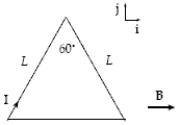
A)Zero
B)IBL in the +z direction
C)IBL in the −z direction
D)1.7 IBL in the +z direction
E)1.4 IBL in the −z direction

A)Zero
B)IBL in the +z direction
C)IBL in the −z direction
D)1.7 IBL in the +z direction
E)1.4 IBL in the −z direction

Unlock Deck
Unlock for access to all 75 flashcards in this deck.
Unlock Deck
k this deck
16
A charged particle (mass = m, charge = q > 0) moves in a region of space where the magnetic field has a constant magnitude of B and a downward direction. What is the magnetic force on the particle at an instant when it is moving horizontally toward the north with speed v?
A)qvB toward the east
B)Zero
C)qvB toward the west
D)qvB upward
E)qvB toward the south
A)qvB toward the east
B)Zero
C)qvB toward the west
D)qvB upward
E)qvB toward the south

Unlock Deck
Unlock for access to all 75 flashcards in this deck.
Unlock Deck
k this deck
17
A straight wire of length L carries a current I in the positive z direction in a region where the magnetic field is uniform and specified by Bx = 3B, By = −2B, and Bz = B, where B is a constant. What is the magnitude of the magnetic force on the wire?
A)3.2 ILB
B)5.0 ILB
C)4.2 ILB
D)3.6 ILB
E)1.0 ILB
A)3.2 ILB
B)5.0 ILB
C)4.2 ILB
D)3.6 ILB
E)1.0 ILB

Unlock Deck
Unlock for access to all 75 flashcards in this deck.
Unlock Deck
k this deck
18
A charged particle (mass = 4.0 μg, charge = 5.0 μC) moves in a region where the only force on it is magnetic. What is the magnitude of the acceleration of the particle at a point where the speed of the particle is 5.0 km/s, the magnitude of the magnetic field is 8.0 mT, and the angle between the direction of the magnetic field and the velocity of the particle is 60°?
A)39 km/s2
B)43 km/s2
C)48 km/s2
D)52 km/s2
E)25 km/s2
A)39 km/s2
B)43 km/s2
C)48 km/s2
D)52 km/s2
E)25 km/s2

Unlock Deck
Unlock for access to all 75 flashcards in this deck.
Unlock Deck
k this deck
19
An electron moving in the positive x direction experiences a magnetic force in the positive z direction. If Bx = 0, what is the direction of the magnetic field?
A)negative y direction
B)positive y direction
C)negative z direction
D)positive z direction
E)negative x direction
A)negative y direction
B)positive y direction
C)negative z direction
D)positive z direction
E)negative x direction

Unlock Deck
Unlock for access to all 75 flashcards in this deck.
Unlock Deck
k this deck
20
A positively charged particle has a velocity in the negative z direction at point P. The magnetic force on the particle at this point is in the negative y direction. Which one of the following statements about the magnetic field at point P can be determined from this data?
A)Bx is positive.
B)Bz is positive.
C)By is negative.
D)By is positive.
E)Bx is negative.
A)Bx is positive.
B)Bz is positive.
C)By is negative.
D)By is positive.
E)Bx is negative.

Unlock Deck
Unlock for access to all 75 flashcards in this deck.
Unlock Deck
k this deck
21
What current must be maintained in a square loop (50 cm on a side) to create a torque of 1.0 N ⋅ m about an axis through its center and parallel to one of its sides when a magnetic field of magnitude 70 mT is directed at 40° to the plane of the loop?
A)66 A
B)89 A
C)61 A
D)75 A
E)37 A
A)66 A
B)89 A
C)61 A
D)75 A
E)37 A

Unlock Deck
Unlock for access to all 75 flashcards in this deck.
Unlock Deck
k this deck
22
A proton with a kinetic energy of 0.20 keV follows a circular path in a region where the magnetic field is uniform and has a magnitude of 60 mT. What is the radius of this path?
A)4.1 cm
B)2.9 cm
C)3.4 cm
D)5.1 cm
E)2.4 cm
A)4.1 cm
B)2.9 cm
C)3.4 cm
D)5.1 cm
E)2.4 cm

Unlock Deck
Unlock for access to all 75 flashcards in this deck.
Unlock Deck
k this deck
23
A deuteron is accelerated from rest through a 10-kV potential difference and then moves perpendicularly to a uniform magnetic field with B = 1.6 T. What is the radius of the resulting circular path? (deuteron: m = 3.3 × 10−27 kg, q = 1.6 × 10−19 C)
A)19 mm
B)13 mm
C)20 mm
D)10 mm
E)9.0 mm
A)19 mm
B)13 mm
C)20 mm
D)10 mm
E)9.0 mm

Unlock Deck
Unlock for access to all 75 flashcards in this deck.
Unlock Deck
k this deck
24
Two single charged ions moving perpendicularly to a uniform magnetic field (B = 0.40 T) with speeds of 5000 km/s follow circular paths that differ in diameter by 5.0 cm. What is the difference in the mass of these two ions?
A)2.6 × 10−28 kg
B)6.4 × 10−28 kg
C)3.2 × 10−28 kg
D)5.1 × 10−28 kg
E)1.1 × 10−28 kg
A)2.6 × 10−28 kg
B)6.4 × 10−28 kg
C)3.2 × 10−28 kg
D)5.1 × 10−28 kg
E)1.1 × 10−28 kg

Unlock Deck
Unlock for access to all 75 flashcards in this deck.
Unlock Deck
k this deck
25
The boundary shown is that of a uniform magnetic field directed in the positive z direction. An electron enters the magnetic field with a velocity pointing along the x axis and exits 0.63 μs later at point A. What is the magnitude of the magnetic field? 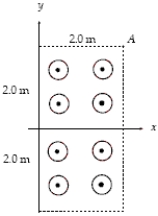
A)18 μT
B)14 μT
C)28 μT
D)34 μT
E)227 μT

A)18 μT
B)14 μT
C)28 μT
D)34 μT
E)227 μT

Unlock Deck
Unlock for access to all 75 flashcards in this deck.
Unlock Deck
k this deck
26
The figure shows the orientation of a rectangular loop consisting of 80 closely wrapped turns each carrying a current I. The magnetic field in the region is (  ) mT. The loop can turn about the y axis. If θ = 30°, a = 0.40 m, b = 0.30 m, and I = 8.0 A, what is the magnitude of the torque exerted on the loop?
) mT. The loop can turn about the y axis. If θ = 30°, a = 0.40 m, b = 0.30 m, and I = 8.0 A, what is the magnitude of the torque exerted on the loop? 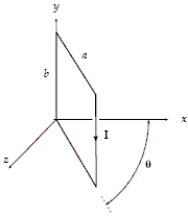
A)2.5 N ⋅ m
B)1.5 N ⋅ m
C)3.1 N ⋅ m
D)2.7 N ⋅ m
E)0.34 N ⋅ m
 ) mT. The loop can turn about the y axis. If θ = 30°, a = 0.40 m, b = 0.30 m, and I = 8.0 A, what is the magnitude of the torque exerted on the loop?
) mT. The loop can turn about the y axis. If θ = 30°, a = 0.40 m, b = 0.30 m, and I = 8.0 A, what is the magnitude of the torque exerted on the loop? 
A)2.5 N ⋅ m
B)1.5 N ⋅ m
C)3.1 N ⋅ m
D)2.7 N ⋅ m
E)0.34 N ⋅ m

Unlock Deck
Unlock for access to all 75 flashcards in this deck.
Unlock Deck
k this deck
27
A circular coil (radius = 0.40 m) has 160 turns and is in a uniform magnetic field. When the orientation of the coil is varied through all possible positions, the maximum torque on the coil by magnetic forces is 0.16 N ⋅ m when the current in the coil is 4.0 mA. What is the magnitude of the magnetic field?
A)0.37 T
B)1.6 T
C)0.50 T
D)1.2 T
E)2.5 T
A)0.37 T
B)1.6 T
C)0.50 T
D)1.2 T
E)2.5 T

Unlock Deck
Unlock for access to all 75 flashcards in this deck.
Unlock Deck
k this deck
28
A straight 10-cm wire bent at its midpoint so as to form an angle of 90° carries a current of 10 A. It lies in the xy plane in a region where the magnetic field is in the positive z direction and has a constant magnitude of 3.0 mT. What is the magnitude of the magnetic force on this wire?
A)3.2 mN
B)2.1 mN
C)5.3 mN
D)4.2 mN
E)6.0 mN
A)3.2 mN
B)2.1 mN
C)5.3 mN
D)4.2 mN
E)6.0 mN

Unlock Deck
Unlock for access to all 75 flashcards in this deck.
Unlock Deck
k this deck
29
A circular loop (radius = 0.50 m) carries a current of 3.0 A and has unit normal vector of  /3. What is the x component of the torque on this loop when it is placed in a uniform magnetic field of
/3. What is the x component of the torque on this loop when it is placed in a uniform magnetic field of  T?
T?
A)4.7 N ⋅ m
B)3.1 N ⋅ m
C)19 N ⋅ m
D)9.4 N ⋅ m
E)12 N ⋅ m
 /3. What is the x component of the torque on this loop when it is placed in a uniform magnetic field of
/3. What is the x component of the torque on this loop when it is placed in a uniform magnetic field of  T?
T?A)4.7 N ⋅ m
B)3.1 N ⋅ m
C)19 N ⋅ m
D)9.4 N ⋅ m
E)12 N ⋅ m

Unlock Deck
Unlock for access to all 75 flashcards in this deck.
Unlock Deck
k this deck
30
A square loop (L = 0.20 m) consists of 50 closely wrapped turns, each carrying a current of 0.50 A. The loop is oriented as shown in a uniform magnetic field of 0.40 T directed in the positive y direction. What is the magnitude of the torque on the loop? 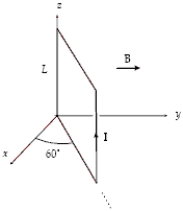
A)0.21 N ⋅ m
B)0.20 N ⋅ m
C)0.35 N ⋅ m
D)0.12 N ⋅ m
E)1.73 N ⋅ m

A)0.21 N ⋅ m
B)0.20 N ⋅ m
C)0.35 N ⋅ m
D)0.12 N ⋅ m
E)1.73 N ⋅ m

Unlock Deck
Unlock for access to all 75 flashcards in this deck.
Unlock Deck
k this deck
31
What is the radius of curvature of the path of a 3.0-keV proton in a perpendicular magnetic field of magnitude 0.80 T?
A)9.9 mm
B)1.1 cm
C)1.3 cm
D)1.4 cm
E)7.6 mm
A)9.9 mm
B)1.1 cm
C)1.3 cm
D)1.4 cm
E)7.6 mm

Unlock Deck
Unlock for access to all 75 flashcards in this deck.
Unlock Deck
k this deck
32
A charged particle (m = 5.0 g, q = −70 μC) moves horizontally at a constant speed of 30 km/s in a region where the free fall gravitational acceleration is 9.8 m/s2 downward, the electric field is 700 N/C upward, and the magnetic field is perpendicular to the velocity of the particle. What is the magnitude of the magnetic field in this region?
A)47 mT
B)zero
C)23 mT
D)35 mT
E)12 mT
A)47 mT
B)zero
C)23 mT
D)35 mT
E)12 mT

Unlock Deck
Unlock for access to all 75 flashcards in this deck.
Unlock Deck
k this deck
33
A wire (mass = 50 g, length = 40 cm) is suspended horizontally by two vertical wires which conduct a current I = 8.0 A, as shown in the figure. The magnetic field in the region is into the paper and has a magnitude of 60 mT. What is the tension in either wire? 
A)0.15 N
B)0.68 N
C)0.30 N
D)0.34 N
E)0.10 N

A)0.15 N
B)0.68 N
C)0.30 N
D)0.34 N
E)0.10 N

Unlock Deck
Unlock for access to all 75 flashcards in this deck.
Unlock Deck
k this deck
34
What is the magnetic force on a 2.0-m length of (straight) wire carrying a current of 30 A in a region where a uniform magnetic field has a magnitude of 55 mT and is directed at an angle of 20° away from the wire?
A)1.5 N
B)1.3 N
C)1.1 N
D)1.7 N
E)3.1 N
A)1.5 N
B)1.3 N
C)1.1 N
D)1.7 N
E)3.1 N

Unlock Deck
Unlock for access to all 75 flashcards in this deck.
Unlock Deck
k this deck
35
A proton moves around a circular path (radius = 2.0 mm) in a uniform 0.25-T magnetic field. What total distance does this proton travel during a 1.0-s time interval? (m = 1.67 × 10−27 kg, q = 1.6 × 10−19 C)
A)82 km
B)59 km
C)71 km
D)48 km
E)7.5 km
A)82 km
B)59 km
C)71 km
D)48 km
E)7.5 km

Unlock Deck
Unlock for access to all 75 flashcards in this deck.
Unlock Deck
k this deck
36
A current of 4.0 A is maintained in a single circular loop having a circumference of 80 cm. An external magnetic field of 2.0 T is directed so that the angle between the field and the plane of the loop is 20°. Determine the magnitude of the torque exerted on the loop by the magnetic forces acting upon it.
A)0.41 N ⋅ m
B)0.14 N ⋅ m
C)0.38 N ⋅ m
D)0.27 N ⋅ m
E)0.77 N ⋅ m
A)0.41 N ⋅ m
B)0.14 N ⋅ m
C)0.38 N ⋅ m
D)0.27 N ⋅ m
E)0.77 N ⋅ m

Unlock Deck
Unlock for access to all 75 flashcards in this deck.
Unlock Deck
k this deck
37
A 500-eV electron and a 300-eV electron trapped in a uniform magnetic field move in circular paths in a plane perpendicular to the magnetic field. What is the ratio of the radii of their orbits?
A)2.8
B)1.7
C)1.3
D)4.0
E)1.0
A)2.8
B)1.7
C)1.3
D)4.0
E)1.0

Unlock Deck
Unlock for access to all 75 flashcards in this deck.
Unlock Deck
k this deck
38
A rectangular coil (0.20 m × 0.80 m) has 200 turns and is in a uniform magnetic field of 0.30 T. When the orientation of the coil is varied through all possible positions, the maximum torque on the coil by magnetic forces is 0.080 N ⋅ m. What is the current in the coil?
A)5.0 mA
B)1.7 A
C)8.3 mA
D)1.0 A
E)42 mA
A)5.0 mA
B)1.7 A
C)8.3 mA
D)1.0 A
E)42 mA

Unlock Deck
Unlock for access to all 75 flashcards in this deck.
Unlock Deck
k this deck
39
An electron follows a circular path (radius = 15 cm) in a uniform magnetic field (magnitude = 3.0 G). What is the period of this motion?
A)0.12 μs
B)1.2 ms
C)0.18 μs
D)1.8 ms
E)1.8 μs
A)0.12 μs
B)1.2 ms
C)0.18 μs
D)1.8 ms
E)1.8 μs

Unlock Deck
Unlock for access to all 75 flashcards in this deck.
Unlock Deck
k this deck
40
The figure shows the orientation of a flat circular loop consisting of 50 closely wrapped turns each carrying a current I. The magnetic field in the region is directed in the positive z direction and has a magnitude of 50 mT. The loop can turn about the y axis. If θ = 20°, R = 0.50 m, and I = 12 A, what is the magnitude of the torque exerted on the loop? 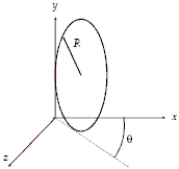
A)8.1 N ⋅ m
B)24 N ⋅ m
C)22 N ⋅ m
D)13 N ⋅ m
E)16 N ⋅ m

A)8.1 N ⋅ m
B)24 N ⋅ m
C)22 N ⋅ m
D)13 N ⋅ m
E)16 N ⋅ m

Unlock Deck
Unlock for access to all 75 flashcards in this deck.
Unlock Deck
k this deck
41
The point P lies along the perpendicular bisector of the line connecting two long straight wires S and T perpendicular to the page. A set of directions A through H is shown next to the diagram. When the two equal currents in the wires are directed up out of the page, the direction of the magnetic field at P is closest to the direction of 
A)E.
B)F.
C)G.
D)H.
E)A.

A)E.
B)F.
C)G.
D)H.
E)A.

Unlock Deck
Unlock for access to all 75 flashcards in this deck.
Unlock Deck
k this deck
42
The point P lies along the perpendicular bisector of the line connecting two long straight wires S and T perpendicular to the page. A set of directions A through H is shown next to the diagram. When the two equal currents in the wires are directed into the page, the direction of the magnetic field at P is closest to the direction of 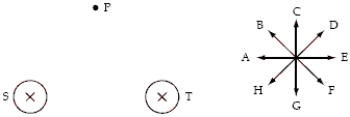
A)A
B)B.
C)C.
D)D.
E)E.

A)A
B)B.
C)C.
D)D.
E)E.

Unlock Deck
Unlock for access to all 75 flashcards in this deck.
Unlock Deck
k this deck
43
The diagram below shows the position of a long straight wire perpendicular to the page and a set of directions labeled A through H. When the current in the wire is directed up out of the page, the direction of the magnetic field at point P is 
A)D.
B)E.
C)F.
D)G.
E)H.

A)D.
B)E.
C)F.
D)G.
E)H.

Unlock Deck
Unlock for access to all 75 flashcards in this deck.
Unlock Deck
k this deck
44
Equal charges, one at rest, the other having a velocity of 104 m/s, are released in a uniform magnetic field. Which charge has the largest force exerted on it by the magnetic field?
A)The charge that is at rest.
B)The charge that is moving, if its velocity is parallel to the magnetic field direction when it is released.
C)The charge that is moving if its velocity makes an angle of 45o with the direction of the magnetic field when it is released.
D)The charge that is moving if its velocity is perpendicular to the magnetic field direction when it is released.
E)All the charges above experience equal forces when released in the same magnetic field.
A)The charge that is at rest.
B)The charge that is moving, if its velocity is parallel to the magnetic field direction when it is released.
C)The charge that is moving if its velocity makes an angle of 45o with the direction of the magnetic field when it is released.
D)The charge that is moving if its velocity is perpendicular to the magnetic field direction when it is released.
E)All the charges above experience equal forces when released in the same magnetic field.

Unlock Deck
Unlock for access to all 75 flashcards in this deck.
Unlock Deck
k this deck
45
The diagram below shows the position of a long straight wire perpendicular to the page and a set of directions labeled A through H. When the current in the wire is directed up out of the page, the direction of the magnetic field at point P is 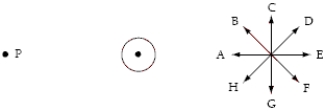
A)E.
B)F.
C)G.
D)H.
E)A.

A)E.
B)F.
C)G.
D)H.
E)A.

Unlock Deck
Unlock for access to all 75 flashcards in this deck.
Unlock Deck
k this deck
46
A magnetic field is directed out of the page. Two charged particles enter from the top and take the paths shown in the figure. Which statement is correct? 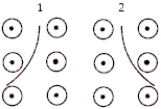
A)Particle 1 has a positive charge and particle 2 has a negative charge.
B)Both particles are positively charged.
C)Both particles are negatively charged.
D)Particle one has a negative charge and particle 2 has a positive charge.
E)The direction of the paths depends on the magnitude of the velocity, not on the sign of the charge.

A)Particle 1 has a positive charge and particle 2 has a negative charge.
B)Both particles are positively charged.
C)Both particles are negatively charged.
D)Particle one has a negative charge and particle 2 has a positive charge.
E)The direction of the paths depends on the magnitude of the velocity, not on the sign of the charge.

Unlock Deck
Unlock for access to all 75 flashcards in this deck.
Unlock Deck
k this deck
47
A proton is accelerated from rest through a potential difference of 150 V. It then enters a region of uniform magnetic field and moves in a circular path (radius = 12 cm). What is the magnitude of the magnetic field in this region?
A)18 mT
B)12 mT
C)15 mT
D)22 mT
E)10 mT
A)18 mT
B)12 mT
C)15 mT
D)22 mT
E)10 mT

Unlock Deck
Unlock for access to all 75 flashcards in this deck.
Unlock Deck
k this deck
48
One reason why we know that magnetic fields are not the same as electric fields is because the force exerted on a charge +q
A)is in opposite directions in electric and magnetic fields.
B)is in the same direction in electric and magnetic fields.
C)is parallel to a magnetic field and perpendicular to an electric field.
D)is parallel to an electric field and perpendicular to a magnetic field.
E)is zero in both if the charge is not moving.
A)is in opposite directions in electric and magnetic fields.
B)is in the same direction in electric and magnetic fields.
C)is parallel to a magnetic field and perpendicular to an electric field.
D)is parallel to an electric field and perpendicular to a magnetic field.
E)is zero in both if the charge is not moving.

Unlock Deck
Unlock for access to all 75 flashcards in this deck.
Unlock Deck
k this deck
49
The diagram below shows the position of a long straight wire perpendicular to the page and a set of directions labeled A through H. When the current in the wire is directed up out of the page, the direction of the magnetic field at point P is 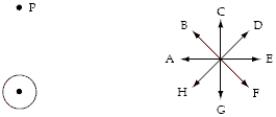
A)E.
B)F.
C)G.
D)H.
E)A.

A)E.
B)F.
C)G.
D)H.
E)A.

Unlock Deck
Unlock for access to all 75 flashcards in this deck.
Unlock Deck
k this deck
50
You stand near the Earth's equator. A positively charged particle that starts moving parallel to the surface of the Earth in a straight line directed east is initially deflected upwards. If you know there are no electric fields in the vicinity, a possible reason why the particle does not initially acquire a downward component of velocity is because near the equator the magnetic field lines of the Earth are directed
A)upward.
B)downward.
C)from south to north.
D)from north to south.
E)from east to west.
A)upward.
B)downward.
C)from south to north.
D)from north to south.
E)from east to west.

Unlock Deck
Unlock for access to all 75 flashcards in this deck.
Unlock Deck
k this deck
51
The point P lies along the perpendicular bisector of the line connecting two long straight wires S and T that are perpendicular to the page. A set of directions A through H is shown next to the diagram. When the two equal currents in the wires are directed up out of the page, the direction of the magnetic field at P is closest to the direction of 
A)E.
B)F.
C)G.
D)H.
E)A

A)E.
B)F.
C)G.
D)H.
E)A

Unlock Deck
Unlock for access to all 75 flashcards in this deck.
Unlock Deck
k this deck
52
What is the kinetic energy of an electron that passes undeviated through perpendicular electric and magnetic fields if E = 4.0 kV/m and B = 8.0 mT?
A)0.65 eV
B)0.71 eV
C)0.84 eV
D)0.54 eV
E)1.4 eV
A)0.65 eV
B)0.71 eV
C)0.84 eV
D)0.54 eV
E)1.4 eV

Unlock Deck
Unlock for access to all 75 flashcards in this deck.
Unlock Deck
k this deck
53
What value of B should be used in a velocity selector to separate out 2.0-keV protons if E is fixed at 80 kV/m?
A)0.18 T
B)0.11 T
C)0.15 T
D)0.13 T
E)0.23 T
A)0.18 T
B)0.11 T
C)0.15 T
D)0.13 T
E)0.23 T

Unlock Deck
Unlock for access to all 75 flashcards in this deck.
Unlock Deck
k this deck
54
The diagram below shows the position of a long straight wire perpendicular to the page and a set of directions labeled A through H.  When the current in the wire is directed up out of the page, the direction of the magnetic field at point P is
When the current in the wire is directed up out of the page, the direction of the magnetic field at point P is
A)A.
B)B.
C)C.
D)D.
E)E.
 When the current in the wire is directed up out of the page, the direction of the magnetic field at point P is
When the current in the wire is directed up out of the page, the direction of the magnetic field at point P isA)A.
B)B.
C)C.
D)D.
E)E.

Unlock Deck
Unlock for access to all 75 flashcards in this deck.
Unlock Deck
k this deck
55
A velocity selector uses a fixed electric field of magnitude E and the magnetic field is varied to select particles of various energies. If a magnetic field of magnitude B is used to select a particle of a certain energy and mass, what magnitude of magnetic field is needed to select a particle of equal mass but twice the energy?
A)0.50 B
B)1.4 B
C)2.0 B
D)0.71 B
E)1.7 B
A)0.50 B
B)1.4 B
C)2.0 B
D)0.71 B
E)1.7 B

Unlock Deck
Unlock for access to all 75 flashcards in this deck.
Unlock Deck
k this deck
56
A coaxial cable has an inner cylindrical conductor surrounded by cylindrical insulation and an outer cylindrical conducting shell. The outer shell carries the same current but in the opposite direction from that in the inner conductor as shown. If the coaxial cable sits in a uniform magnetic field directed upwards with respect to the cable, the effect of the field on the cable is 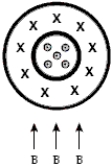
A)a net force to the left.
B)a net force to the right.
C)a net force upwards.
D)no net force but a slight shift of the inner conductor to the left and the outer conductor to the right.
E)no net force but a slight shift of the inner conductor to the right and the outer conductor to the left.

A)a net force to the left.
B)a net force to the right.
C)a net force upwards.
D)no net force but a slight shift of the inner conductor to the left and the outer conductor to the right.
E)no net force but a slight shift of the inner conductor to the right and the outer conductor to the left.

Unlock Deck
Unlock for access to all 75 flashcards in this deck.
Unlock Deck
k this deck
57
A current loop is oriented in three different positions relative to a uniform magnetic field. In position 1 the plane of the loop is perpendicular to the field lines. In positionS 2 and 3 the plane of the loop is parallel to the field as shown. The torque on the loop is maximum in 
A)position 1.
B)position 2.
C)position 3
D)positions 2 and 3.
E)all three positions.

A)position 1.
B)position 2.
C)position 3
D)positions 2 and 3.
E)all three positions.

Unlock Deck
Unlock for access to all 75 flashcards in this deck.
Unlock Deck
k this deck
58
Three particles of equal charge, X, Y, and Z, enter a uniform magnetic field  . X has velocity of magnitude v parallel to the field. Y has velocity of magnitude v perpendicular to the field. Z has equal velocity components v parallel and perpendicular to the field. Rank the radii of their orbits from least to greatest.
. X has velocity of magnitude v parallel to the field. Y has velocity of magnitude v perpendicular to the field. Z has equal velocity components v parallel and perpendicular to the field. Rank the radii of their orbits from least to greatest.
A)Rx = Ry < Rz.
B)Rx < Ry < Rz.
C)Rx = Ry = Rz.
D)Rx > Ry > Rz.
E)Rx < Ry = .
.
 . X has velocity of magnitude v parallel to the field. Y has velocity of magnitude v perpendicular to the field. Z has equal velocity components v parallel and perpendicular to the field. Rank the radii of their orbits from least to greatest.
. X has velocity of magnitude v parallel to the field. Y has velocity of magnitude v perpendicular to the field. Z has equal velocity components v parallel and perpendicular to the field. Rank the radii of their orbits from least to greatest.A)Rx = Ry < Rz.
B)Rx < Ry < Rz.
C)Rx = Ry = Rz.
D)Rx > Ry > Rz.
E)Rx < Ry =
 .
.
Unlock Deck
Unlock for access to all 75 flashcards in this deck.
Unlock Deck
k this deck
59
A proton is accelerated from rest through a potential difference of 2.5 kV and then moves perpendicularly through a uniform 0.60-T magnetic field. What is the radius of the resulting path?
A)15 mm
B)12 mm
C)18 mm
D)24 mm
E)8.5 mm
A)15 mm
B)12 mm
C)18 mm
D)24 mm
E)8.5 mm

Unlock Deck
Unlock for access to all 75 flashcards in this deck.
Unlock Deck
k this deck
60
The point P lies along the perpendicular bisector of the line connecting two long straight wires S and T perpendicular to the page. A set of directions A through H is shown next to the diagram. When the two equal currents in the wires are directed into the page, the direction of the magnetic field at P is closest to the direction of 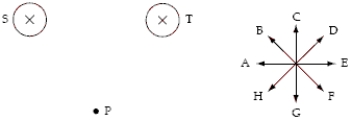
A)E.
B)F.
C)G.
D)H.
E)A.

A)E.
B)F.
C)G.
D)H.
E)A.

Unlock Deck
Unlock for access to all 75 flashcards in this deck.
Unlock Deck
k this deck
61
An unusual lightning strike has a vertical portion with a positive current of +400 A upwards. The Earth's magnetic field at that location is parallel to the ground and has a magnitude of 30 μT. In N, the force exerted by the Earth's magnetic field on the 25-m-long current is
A)0.
B)0.012 N, East.
C)0.012 N, West.
D)0.30 N, West.
E)300 N, East.
A)0.
B)0.012 N, East.
C)0.012 N, West.
D)0.30 N, West.
E)300 N, East.

Unlock Deck
Unlock for access to all 75 flashcards in this deck.
Unlock Deck
k this deck
62
A thin ribbon of a silver alloy 2.00-cm wide and 0.0150-mm thick carries a current of 6.98 A perpendicular to a magnetic field. The Hall voltage is found to be 1.24 × 10−4 V when the magnetic field is 2.50 T. Calculate n, the number of charge carriers per cubic meter.

Unlock Deck
Unlock for access to all 75 flashcards in this deck.
Unlock Deck
k this deck
63
The magnetic dipole moment of an electron (charge = −e; mass = me) moving in a circular orbit of radius r with speed v about a nucleus of mass mN is proportional to
A)r.
B)v.
C)vr.
D)evr.
E)mNvr.
A)r.
B)v.
C)vr.
D)evr.
E)mNvr.

Unlock Deck
Unlock for access to all 75 flashcards in this deck.
Unlock Deck
k this deck
64
The magnetic field in a region of space is parallel to the surface of a long flat table. Imagine that this page is lying flat on the table. When current is present in the coil, which is lying on the table, the coil tends to rotate so that the left side moves up and the right side moves down. The magnetic field is 
A)directed parallel to the page and downwards.
B)directed parallel to the page and upwards.
C)directed parallel to the page and to the right.
D)directed parallel to the page and to the left.
E)in a direction that cannot be determined in this experiment

A)directed parallel to the page and downwards.
B)directed parallel to the page and upwards.
C)directed parallel to the page and to the right.
D)directed parallel to the page and to the left.
E)in a direction that cannot be determined in this experiment

Unlock Deck
Unlock for access to all 75 flashcards in this deck.
Unlock Deck
k this deck
65
An unusual lightning strike has a vertical portion with a current of −400 A downwards. The Earth's magnetic field at that location is parallel to the ground and has a magnitude of 30 μT. In N, the force exerted by the Earth's magnetic field on the 25 m-long current is
A)0.
B)0.012 N, East.
C)0.012 N, West.
D)0.30 N, West.
E)300 N, East.
A)0.
B)0.012 N, East.
C)0.012 N, West.
D)0.30 N, West.
E)300 N, East.

Unlock Deck
Unlock for access to all 75 flashcards in this deck.
Unlock Deck
k this deck
66
A stream of electrons passes through a velocity filter where the crossed magnetic and electric fields are 0.020 T and 5.00 × 104 V/m, respectively. Find the kinetic energy (in electron volts) of the electrons passing through the filter. [1 eV = 1.60 × 10−19 J]

Unlock Deck
Unlock for access to all 75 flashcards in this deck.
Unlock Deck
k this deck
67
A physicist claims that she has found a new particle with a mass 200,000 times the mass of the proton (1.67 × 10−27 kg) and a charge of 3.20 × 10−19 C. If she is correct, such a particle traveling in a circle in a uniform 5.00-T magnetic field at a velocity of 2 500 m/s will have a radius of
A)0.261 m.
B)0.522 m.
C)1.04 m.
D)3.27 m.
E)3.13 × 1026 m.
A)0.261 m.
B)0.522 m.
C)1.04 m.
D)3.27 m.
E)3.13 × 1026 m.

Unlock Deck
Unlock for access to all 75 flashcards in this deck.
Unlock Deck
k this deck
68
Two wires, each having a weight per unit length of 1.0 × 10−4 N/m, are strung parallel, one 0.10 m above the other. If the wires carry the same current, though in opposite directions, how great must the current in each wire be for the magnetic field of the lower conductor to balance the weight of the upper conductor?

Unlock Deck
Unlock for access to all 75 flashcards in this deck.
Unlock Deck
k this deck
69
On the average, in a ferromagnetic domain permanent atomic magnetic moments are aligned ____ to one another.
A)antiparallel
B)parallel
C)perpendicular
D)alternately parallel and antiparallel
E)randomly relative
A)antiparallel
B)parallel
C)perpendicular
D)alternately parallel and antiparallel
E)randomly relative

Unlock Deck
Unlock for access to all 75 flashcards in this deck.
Unlock Deck
k this deck
70
When a ferromagnetic material that has been magnetized is brought to a temperature greater than the Curie temperature, what happens to its residual magnetism?
A)Nothing happens to the residual magnetism.
B)The residual magnetism disappears.
C)The residual magnetism reaches it's highest value.
D)All the magnetic domains causing magnetism become a single domain.
E)The material of the magnet melts causing currents that are magnetic.
A)Nothing happens to the residual magnetism.
B)The residual magnetism disappears.
C)The residual magnetism reaches it's highest value.
D)All the magnetic domains causing magnetism become a single domain.
E)The material of the magnet melts causing currents that are magnetic.

Unlock Deck
Unlock for access to all 75 flashcards in this deck.
Unlock Deck
k this deck
71
The reason the north pole of a bar magnet free to rotate points north is because
A)the south geographic pole of the earth is the Earth's magnetic north pole.
B)the south geographic pole of the earth is the Earth's magnetic south pole.
C)there is a net accumulation of negative magnetic charge at the Earth's south geographic pole.
D)there is a net accumulation of positive magnetic charge at the Earth's north geographic pole.
E)the north geographic pole of the Earth is the earth's magnetic north pole.
A)the south geographic pole of the earth is the Earth's magnetic north pole.
B)the south geographic pole of the earth is the Earth's magnetic south pole.
C)there is a net accumulation of negative magnetic charge at the Earth's south geographic pole.
D)there is a net accumulation of positive magnetic charge at the Earth's north geographic pole.
E)the north geographic pole of the Earth is the earth's magnetic north pole.

Unlock Deck
Unlock for access to all 75 flashcards in this deck.
Unlock Deck
k this deck
72
An explorer walks into a lab in a science building. She has a compass in her hand and finds that the south pole of her compass points toward the room's east wall when she is nearer that wall and toward the west wall when she is nearer that wall. You could explain this if magnetized metal had been installed in the east and west walls with north poles pointing into the room. If no magnetic material was installed in the north or south walls of the room, she would expect that
A)the south pole of the compass would tend to point toward those walls.
B)the north pole of the compass would tend to point toward those walls.
C)the compass needle would not point in any particular direction.
D)the north pole of the compass needle would tend to point toward the centers of those walls, but the south pole would tend to point toward the sides of those walls.
E)the south pole of the compass needle would tend to point toward the centers of those walls, but the north pole would tend to point toward the sides of those walls.
A)the south pole of the compass would tend to point toward those walls.
B)the north pole of the compass would tend to point toward those walls.
C)the compass needle would not point in any particular direction.
D)the north pole of the compass needle would tend to point toward the centers of those walls, but the south pole would tend to point toward the sides of those walls.
E)the south pole of the compass needle would tend to point toward the centers of those walls, but the north pole would tend to point toward the sides of those walls.

Unlock Deck
Unlock for access to all 75 flashcards in this deck.
Unlock Deck
k this deck
73
At what speed would a proton need to circle the Earth at a height of 1000 km above the equator if the Earth's magnetic field is horizontal and directed north-south, with an intensity of 4.00 × 10−8 T? (The radius of the Earth is 6400 km and the charge and mass of the proton are q = 1.60 × 10−19 C and mp = 1.67 × 10−27 kg. Ignore relativistic corrections.)

Unlock Deck
Unlock for access to all 75 flashcards in this deck.
Unlock Deck
k this deck
74
A magnetic field of 2.00 T is applied to a bubble chamber to make the tracks of protons and other charged particles identifiable by the radius of the circles they move in. If a high-energy proton moves along an arc of a 3.30-m circle, what is the momentum of the proton? [q = 1.60 × 10−19 C, m = 1.67 × 10−27 kg]

Unlock Deck
Unlock for access to all 75 flashcards in this deck.
Unlock Deck
k this deck
75
Bert says that a charged particle in a vacuum can travel in a helix only if a uniform electric field and a uniform magnetic field are both present and both parallel to the axis of the helix. Stuart says that only a magnetic field with a component parallel to the axis of the helix is needed. Which one, if either, is correct, and why?
A)Bert, because the charged particle's velocity can have a vertical component only if an electric field in the vertical direction is present.
B)Stuart, because a component of velocity in the vertical direction is not changed by a vertical component of a magnetic field.
C)Bert, because a component of velocity in the vertical direction is changed by a vertical component of a magnetic field.
D)Stuart, because an electric field in the vertical direction would cause the particle to come to a complete stop.
E)Neither, because particles cannot move in helical paths in the presence of magnetic and electric fields.
A)Bert, because the charged particle's velocity can have a vertical component only if an electric field in the vertical direction is present.
B)Stuart, because a component of velocity in the vertical direction is not changed by a vertical component of a magnetic field.
C)Bert, because a component of velocity in the vertical direction is changed by a vertical component of a magnetic field.
D)Stuart, because an electric field in the vertical direction would cause the particle to come to a complete stop.
E)Neither, because particles cannot move in helical paths in the presence of magnetic and electric fields.

Unlock Deck
Unlock for access to all 75 flashcards in this deck.
Unlock Deck
k this deck


